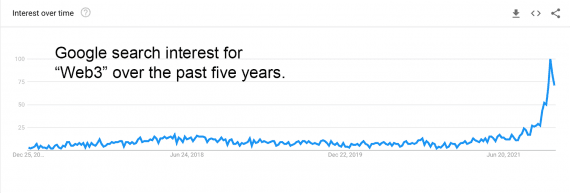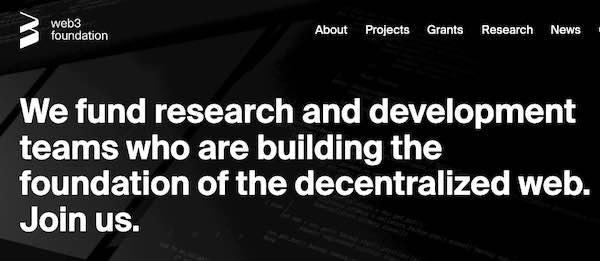The concept of a decentralized web could lead to new forms of ecommerce.
Web3 — sometimes called web 3.0 — is a popular buzzword. Queries on Google for the phrase peaked in early December, with search volume about 20 times that of just a year before.

Google Trends shows an increase in search queries for “web3” in recent months.
Given this rise in interest, the trending web3 concept may be an idea ecommerce business owners and managers should understand.
If widely adopted, web3 may facilitate large and robust ecommerce transactions valued at hundreds of millions of dollars.
Web Evolution
The internet’s origins date back to the 1960s, when it was largely an academic and military project. Today, the web is interactive and social. Web3 proposes a new future for this now vital technology.
Juan Benet, CEO of Protocol Labs, addressed this evolution in four steps.
- The internet describes the protocols and physical connections between computers. It is the “wire and the network.”
- Web 1.0 facilitated the sharing of static files and information — the “read-only” web.
- Web 2.0 added interactivity and social media. It allowed just about anyone to create and share content. Web2 is what we use now for everything from Facebook to ecommerce. It is the “read-write” web.
- Web 3.0 is a software framework that reimagines web applications in a way that dilutes authority, verifies identity and intent, and builds a better, more sustainable set of tools for everyone to share and use, or so its proponents argue.
Web3 is not the “read-write-execute” web that pioneers imagined. It is instead the “read-write-truth” web.
Truth, not Trust
Today, web2 applications rely on centralized, trusted authorities and a handful of trusted security protocols. Everyone using the internet must trust governments and private organizations. This requires trusting both intent and action.
When someone types in a website address, authorities ensure that person ends up at the right site. Someone using Facebook trusts the company to store and share personal information. Someone shopping online must trust the merchants, payment processors, and protocol managers. Folks banking online trust multiple authorities.
The problem with this arrangement is that these authorities and security protocols are not always trustworthy. Here are some examples from 2021.
- App developers unwittingly exposed more than 100 million Android users’ personal information.
- Hackers scraped and disclosed the personal info of some 553 million Facebook users.
- LinkedIn lost control of 700 million user records, releasing full names, phone numbers, physical locations, geolocation data, and more.
In addition to data breaches, which might be described as mistakes, many consumers have concerns about how their info is used by companies and governments.
Such privacy worries have prompted significant changes in data collection laws worldwide and impacted how online advertising works across devices.
In short, web2 apps require trust but don’t always merit it. In contrast, web3 is trustless. The web3 framework assumes no individual or organization is trustworthy, so it verifies identity and intent every time.
It decentralizes applications in much the same way that cryptocurrencies decentralize money.
In a sense, web3 is meant to be a panacea for the security, privacy, and trust issues in the current interactive and social web.
Or to paraphrase Dr. Gavin Wood, an Ethereum (cryptocurrency) founder and the president of the Web3 Foundation, the next generation of the web will have no trust, but it will have truth.

The Web3 Foundation funds “research and development teams who are building the foundation of the decentralized web.”
Economically Strong
“Web3 is an extensible framework for creating massively multi-user, economically strong applications,” said Wood. It is also a “reliable, robust means of helping [an] application stay useful in adverse conditions.”
For our context, the key phrase in Wood’s definition is “economically strong.” According to Wood, this means applications would be safe for very large financial transactions.
Today someone might make an online payment of several thousand dollars without much thought. But two companies closing a $10 million deal would involve lawyers and contracts.
At the $10 million level, web2 ecommerce authorities are just not trustworthy enough. The parties involved would, instead, trust the legal jurisdiction where the contracts are recorded to ensure performance as promised.
“Software such as Facebook or Twitter is not so economically strong…you wouldn’t want to transact agreements worth hundreds of millions of dollars over Facebook,” said Wood.
“What we’re creating are applications that are economically strong, that do give you strong guarantees and the ability to make economically strong signals.”
All of this is theoretical for now. But web3 and associated cryptocurrencies might open the door for new forms of large-scale ecommerce and everyday transactions.
But not yet. Web3 has garnered interest, but it has yet to produce the effects that Wood describes. What’s more, almost no one imagines that web3 will replace web2. Rather, both will live side-by-side for years.





